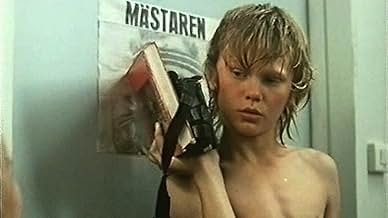Reine mente a sua madre sull'andare al campo estivo, invece di rimanere senza sorveglianza a Stoccolma. Il film descrive le sue avventure e gli incontri in città durante le vacanze estive me... Leggi tuttoReine mente a sua madre sull'andare al campo estivo, invece di rimanere senza sorveglianza a Stoccolma. Il film descrive le sue avventure e gli incontri in città durante le vacanze estive mentre sua madre ignara lavora.Reine mente a sua madre sull'andare al campo estivo, invece di rimanere senza sorveglianza a Stoccolma. Il film descrive le sue avventure e gli incontri in città durante le vacanze estive mentre sua madre ignara lavora.
- Premi
- 3 vittorie e 2 candidature totali
Trama
Lo sapevi?
- QuizBanned in Australia since 2014.
Recensione in evidenza
Telling the story wouldn't be the point at all, would it? Barnens ö, spelled almost like "booné aww" is the title for that brilliant novel of the late seventies that shocked a lot of people, including myself.
Children's Island is the title, and what an island. In the book, Raine, the main character has The Guiness World Record Book as his own Bible. And he's keen on breaking new records himself. In particular the youngest person under water for three minutes.
The story is, as most Swedish films and books of the time, deep, consciously provocative and awe inspiring. Bergman was beginning his final film and Cries and Whispers was barely out. expectations for any Swedish film were pretty high. They taught us then that great theatre, great actors, superb writers and gifted directors made a veritable team of perfection in cinema.
All this said, Barnens Ö is a story of discovery. It is, too, a story of alienation: cities are alienating and living in one of them make us aliens to most of its residents. It is a story of revelations and sudden encounters with our own destiny. It is a film of overwhelming hope and desperation. Of feelings buried under layers and layers of isolation and insulation from a world that couldn't care less...
This approach, in itself, is a pretty difficult way to weave a convincing narrative. Here, the masterful guidance of Kay Pollak on Ola Olsson's script of P C Jersilds novel, turns it not only in a possibility, but in one of those master pieces of cinema.
I may disagree a bit with someone who said that this work was all but forgotten. It is not. Even as I write this in 2009, discussions on P C Jersild's story are conducted all over the world, and the film shown at many film schools and small theatres.
Why? Waxing philosophical on all of it would be difficult and many have already done it scholarly through writing and lectures. The reason why Barnens Ö was and IS a special story is the cosy feeling you get from the start when you discover that everything is told through the eyes of a small child. And that's where it ends, too. Maybe it's a clinical view, as someone else pointed out. But deeply disturbing, moving and satisfying. The concept is deep: as long as we have no pubic hair, we still can live one more day as an angel. Afterwards, we'll become what Raine reflects as the colophon of his experiences: "Men are Pigs". He finds his fears when he's fearless. He finds love when the world is crumbling around him. He discovers a reason not to behave like the grown-ups because he refrains from committing crimes. He let go his inner purity and confidence in others without reservation, just to learn how rotten the soul of a man can be.
Where love is expected, he finds hatred. Where compassion is needed, he finds suspicion and cold hearts. It's a film of metaphors. A film to think and to raise questions that are hard to ask but harder to answer.
In the end, the satisfaction of witnessing such a superb work (that really upped the ante for any other Swedish film after) is a ride of joy and hope. Be aware that it is a film full with the dark side of our nature. But, alas!, a film of hope and deep joy. Reine will still be an Island in Stockholm, but there is the big hope of living today in full, even when we found our first signs of sexual maturity show.
Children's Island is the title, and what an island. In the book, Raine, the main character has The Guiness World Record Book as his own Bible. And he's keen on breaking new records himself. In particular the youngest person under water for three minutes.
The story is, as most Swedish films and books of the time, deep, consciously provocative and awe inspiring. Bergman was beginning his final film and Cries and Whispers was barely out. expectations for any Swedish film were pretty high. They taught us then that great theatre, great actors, superb writers and gifted directors made a veritable team of perfection in cinema.
All this said, Barnens Ö is a story of discovery. It is, too, a story of alienation: cities are alienating and living in one of them make us aliens to most of its residents. It is a story of revelations and sudden encounters with our own destiny. It is a film of overwhelming hope and desperation. Of feelings buried under layers and layers of isolation and insulation from a world that couldn't care less...
This approach, in itself, is a pretty difficult way to weave a convincing narrative. Here, the masterful guidance of Kay Pollak on Ola Olsson's script of P C Jersilds novel, turns it not only in a possibility, but in one of those master pieces of cinema.
I may disagree a bit with someone who said that this work was all but forgotten. It is not. Even as I write this in 2009, discussions on P C Jersild's story are conducted all over the world, and the film shown at many film schools and small theatres.
Why? Waxing philosophical on all of it would be difficult and many have already done it scholarly through writing and lectures. The reason why Barnens Ö was and IS a special story is the cosy feeling you get from the start when you discover that everything is told through the eyes of a small child. And that's where it ends, too. Maybe it's a clinical view, as someone else pointed out. But deeply disturbing, moving and satisfying. The concept is deep: as long as we have no pubic hair, we still can live one more day as an angel. Afterwards, we'll become what Raine reflects as the colophon of his experiences: "Men are Pigs". He finds his fears when he's fearless. He finds love when the world is crumbling around him. He discovers a reason not to behave like the grown-ups because he refrains from committing crimes. He let go his inner purity and confidence in others without reservation, just to learn how rotten the soul of a man can be.
Where love is expected, he finds hatred. Where compassion is needed, he finds suspicion and cold hearts. It's a film of metaphors. A film to think and to raise questions that are hard to ask but harder to answer.
In the end, the satisfaction of witnessing such a superb work (that really upped the ante for any other Swedish film after) is a ride of joy and hope. Be aware that it is a film full with the dark side of our nature. But, alas!, a film of hope and deep joy. Reine will still be an Island in Stockholm, but there is the big hope of living today in full, even when we found our first signs of sexual maturity show.
- carlesmiquel
- 5 gen 2010
- Permalink
I più visti
Accedi per valutare e creare un elenco di titoli salvati per ottenere consigli personalizzati
- How long is Children's Island?Powered by Alexa
Dettagli
- Tempo di esecuzione1 ora 49 minuti
- Mix di suoni
Contribuisci a questa pagina
Suggerisci una modifica o aggiungi i contenuti mancanti





























